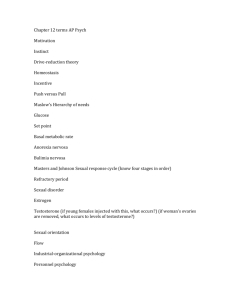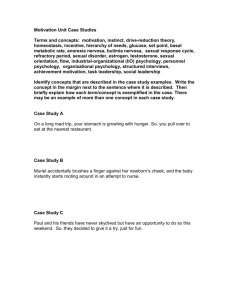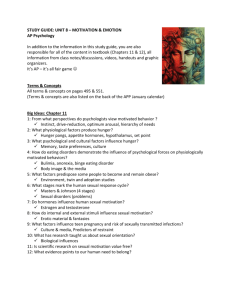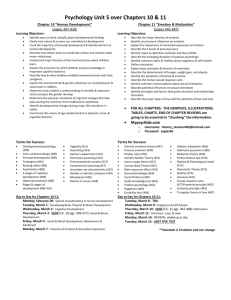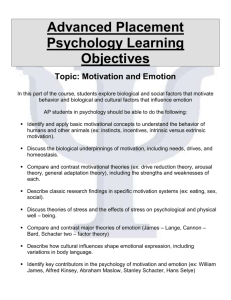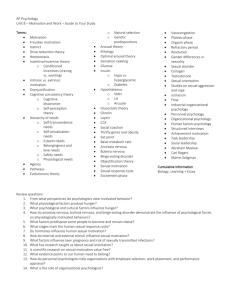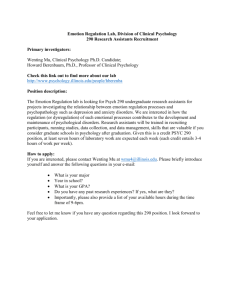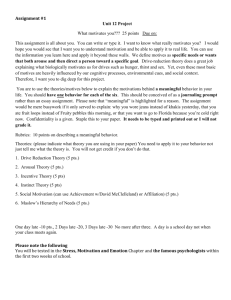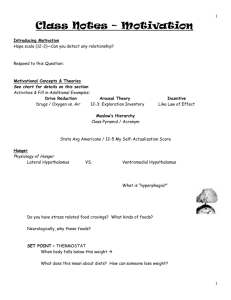AP Psychology: Unit 11 Guide to Your Study
advertisement
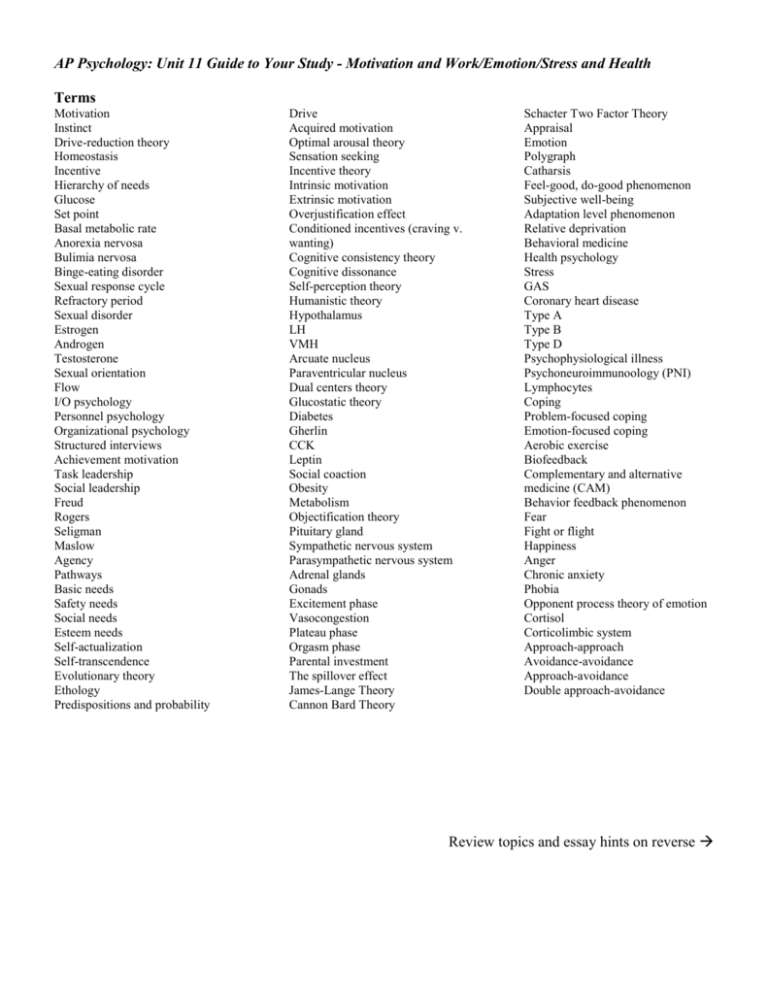
AP Psychology: Unit 11 Guide to Your Study - Motivation and Work/Emotion/Stress and Health Terms Motivation Instinct Drive-reduction theory Homeostasis Incentive Hierarchy of needs Glucose Set point Basal metabolic rate Anorexia nervosa Bulimia nervosa Binge-eating disorder Sexual response cycle Refractory period Sexual disorder Estrogen Androgen Testosterone Sexual orientation Flow I/O psychology Personnel psychology Organizational psychology Structured interviews Achievement motivation Task leadership Social leadership Freud Rogers Seligman Maslow Agency Pathways Basic needs Safety needs Social needs Esteem needs Self-actualization Self-transcendence Evolutionary theory Ethology Predispositions and probability Drive Acquired motivation Optimal arousal theory Sensation seeking Incentive theory Intrinsic motivation Extrinsic motivation Overjustification effect Conditioned incentives (craving v. wanting) Cognitive consistency theory Cognitive dissonance Self-perception theory Humanistic theory Hypothalamus LH VMH Arcuate nucleus Paraventricular nucleus Dual centers theory Glucostatic theory Diabetes Gherlin CCK Leptin Social coaction Obesity Metabolism Objectification theory Pituitary gland Sympathetic nervous system Parasympathetic nervous system Adrenal glands Gonads Excitement phase Vasocongestion Plateau phase Orgasm phase Parental investment The spillover effect James-Lange Theory Cannon Bard Theory Schacter Two Factor Theory Appraisal Emotion Polygraph Catharsis Feel-good, do-good phenomenon Subjective well-being Adaptation level phenomenon Relative deprivation Behavioral medicine Health psychology Stress GAS Coronary heart disease Type A Type B Type D Psychophysiological illness Psychoneuroimmunoology (PNI) Lymphocytes Coping Problem-focused coping Emotion-focused coping Aerobic exercise Biofeedback Complementary and alternative medicine (CAM) Behavior feedback phenomenon Fear Fight or flight Happiness Anger Chronic anxiety Phobia Opponent process theory of emotion Cortisol Corticolimbic system Approach-approach Avoidance-avoidance Approach-avoidance Double approach-avoidance Review topics and essay hints on reverse Review Topics 1. 2. 3. 4. 5. 6. 7. 8. 9. 10. 11. 12. 13. 14. 15. 16. 17. 18. 19. 20. 21. 22. 23. 24. 25. 26. 27. 28. 29. 30. From what perspectives do psychologists view motivated behavior? What physiological factors produce hunger? What psychological and cultural factors influence hunger? How do anorexia nervosa, bulimia nervosa, and binge-eating disorders demonstrate the influence of psychological forces on physiologically motivated behaviors? What factors predispose some people to become and remain obese? What stages mark the human sexual response cycle? Do hormones influence human sexual motivation? How do internal and external stimuli influence sexual motivation? What factors influence teen pregnancy and risk of sexually transmitted infections? What has research taught us about sexual orientation? Is scientific research on sexual motivation value free? What evidence points to our human need to belong? How do personnel psychologists help organizations with employee selection, work placement, and performance appraisal? What is the role of organizational psychologists? What are the components of emotion? What is the link between emotional arousal and the autonomic nervous system? Do different emotions activate different physiological and brain-pattern responses? To experience emotions, must we consciously interpret and label them? How do we communicate nonverbally? Are nonverbal expressions of emotion universally understood? Do our facial expressions influence our feelings? What is the function of fear, and how do we learn fears? What are the causes and consequences of anger? What are the causes and consequences of happiness? What is stress? What events provoke stress responses? Why are some of us more prone than others to coronary heart disease? How does stress make us more vulnerable to disease? What factors affect our ability to cope with stress? What tactics can we sue to manage stress and reduce stress-related ailments? Essay hints (these are possible topics on the essays – some may not be used and others may show up): Hint #1: Earlier this year, we did an essay based on relationships between terms and a concept. Remember that for each pair, you have to use an example to show how the first term in each pair affects or is related to the second. Definitions alone will not score. Possible relationships may include: double-blind research and bias, classical conditioning and fear, operant conditioning and superstition, reinforcement and the overjustification effect, the hippocampus and studying, the cerebellum and dance routines, and fixation and problem solving. Hint #2: Opposing processes are used in multiple areas in psychology. We’ve talked about two so far this year (vision and stress), but there are many more. Can you apply what you know about opponent process to other topics as well? Topics may include ones we’ve talked about – color vision and stress, as well as drug use, nerve-firing, belief perseverance, sympathetic nervous system, parasympathetic nervous system, appetite, and/or motivation theories? Be able to use specific physiological or psychological mechanisms to explain how both aspects of opposing processes apply to each.
